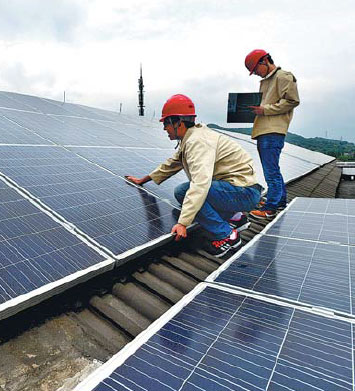Polysilicon sets a shining example of sustained growth
Proprietary technologies have helped to put the Chinese polycrystalline silicon industry on a sustainable growth path, industry insiders said.
Polycrystalline silicon, or polysilicon, is often used as a raw material to make solar panels and integrated circuit chips. Its production once came under fire for heavy pollution and energy consumption.
"Without technological innovation, it would be hard to address the pollution issue when only traditional production methods were available," Yan Dazhou, deputy chief engineer at China Enfi Engineering, a company focusing on nonferrous metal research and development, told China Intellectual Property News, a Beijing-based newspaper.
"Via proprietary research and development, we realized clean production several years ago, enabling a drop of more than 80 percent in comprehensive energy consumption," Yan said, who also serves as the director of a national polysilicon engineering lab.

As a fundamental material of electronics, polysilicon is key to the growth of information technology and new energy industries.
China is rich in silicon resources. Its metallic silicon production accounts for twothirds of the world's total, with three-fourths for export.
Yet the country had long faced an technological blockade in manufacturing polysilicon and had to rely on imports.
To break the overseas monopoly, Enfi spent years in R&D and developed a unique technology path.
In 2005, China Silicon Corp, also known as SinoSico, which is a subsidiary of Enfi, used its own technologies to develop a production line capable of rolling out 300 metric tons of polysilicon a year, the first of its kind in the country.
As a result, the domestic industry reported a marked increase in polysilicon output to more than 1,000 tons in 2007, with SinoSico contributing over a half.
China has since become the largest producer of photovoltaic panels in the world, though it still needs to import related technologies and raw materials.
Despite the rapid growth, Chinese photovoltaic businesses experienced a chill winter, facing the dramatic shrinkage of overseas markets, in 2012.
Thus they turned their attention back to their home turf, which spurred the energy restructuring in the country.
Currently, the domestic industry has formed an estimated 360 billion yuan ($52 billion) market, with many China-made products exported.
Enfi has also increased its investment in environmental technologies. Its achievements include an energy-saving furnace, which enables power consumption of less than 75 kilowatts per hour and 30 kilograms of steam for each kilogram polysilicon.
The data shows China is at the forefront of polysilicon production technologies, according to the company.
Another example is the treatment of the polluting byproducts production. "The previously hazardous byproducts, if treated well, can be sent to production for recycled use," Yan said.
A gas separation and purification technology created by Enfi has subverted the perception of gas byproducts in the production as emissions, the scientist said.
Through the innovated treatment, the recycled use rate can rise to 99.9 percent from 25 percent before, he added.
Purity is a key indicator of polysilicon's quality. Enfi has conducted research into scores of micro-components that affect the purity and their treatment.
"Continuous R&D and improvement in production technologies and machines to reduce costs and energy consumption is the only way for the industry to survive and develop," Yan said. "Proprietary intellectual property rights laid a foundation for the industry's growth."
Over years of efforts in innovation, China has witness a drop in polysilicon prices per ton from 3.25 million yuan 10 years ago to currently 90,000 yuan to 120,000 yuan, he said.
zhuanti@chinadaily.com.cn
|
Technicians at a power company check polysilicon components in solar panels in Zhoushan, Zhejiang province. Yao Feng / For China Daily |
(China Daily 05/25/2017 page17)















